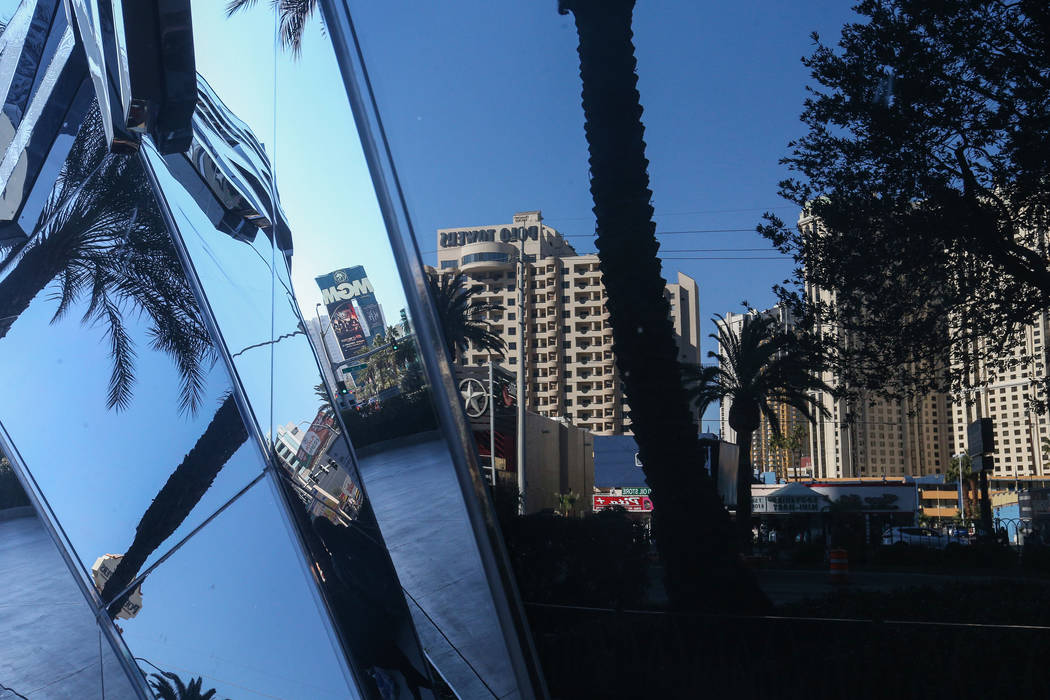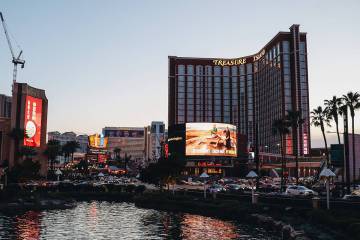Strong Strip, regional results propelled MGM Resorts’ Q4
MGM Resorts International CEO Jim Murren on Wednesday criticized the Justice Department’s “perplexing” Wire Act reinterpretation and made a case for his company landing a gaming concession in Osaka, Japan.
Murren made his remarks in a wide-ranging conference call following an earnings report in which MGM beat analysts’ expectations with strong Strip and regional results for the fourth quarter.
Some of Murren’s most pointed remarks during the conference call with investors involved the January reinterpretation of the Wire Act and how it could affect the nation’s growing sports wagering business.
“This latest missive from the (Department of Justice) is perplexing, (and that’s) an understatement,” Murren said. “If it’s read as words, it would mean that Powerball as it exists in 44 states in the United States isn’t legal anymore. We think it’s an absurdly poorly written and unenforceable opinion and I don’t think anyone in the industry, the gaming industry or the sports-betting industry feels any differently.”
In 2011, the Justice Department interpreted the law to ban sports betting, but enabled interstate poker play and lottery sales. The new interpretation bans all forms of interstate betting, including sports wagering, and also includes other gambling-related interstate communications.
The reinterpretation could ban interstate poker games currently allowed by Nevada, New Jersey and Delaware as well as affect multistate lottery ticket sales.
Japan
Murren also told analysts that the company is in a good position to win a gaming concession in Japan and that it would focus on developing a resort in Osaka.
“We’ve had a lot of progress in Japan. We’ve been there longer than anyone else,” Murren said. “We have a large team there, in both Tokyo and Osaka. We’ve just recently opened an office in Osaka. We’ve committed now to the mayor and the governor of Osaka that MGM has adopted an Osaka-first strategy and we’re focusing our considerable resources on Osaka.”
Murren explained the process once the government announces its rules and policies, probably by summer.
“The next step for Osaka or any other jurisdiction is to go to the central government,” he said. “We know, we think, that Osaka will be one of the three concessions that will likely be granted, but we know that the central government has to select Osaka and its operator. That probably happens 12 to 18 months after Osaka itself picks its operator. Remember, Osaka’s goal is to have an (integrated resort) open by 2025. That’s when the World Expo is in Osaka.
“We have no illusions to the fact that it will not be competitive — it will be highly competitive. But I think the cards are stacked in the favor of those who are prepared, who have been working hard, who will have the best program, the best strategy, the best understanding of the country and the prefecture and I like a lot MGM’s chances.”
Murren also told analysts that a makeover of the MGM Grand’s Strip entrance mentioned in an investors’ day presentation last year isn’t imminent.
“We don’t have to do anything,” Murren said. “We can evaluate. Sometimes we evaluate for quarters and years and do nothing because the market moved away or we have different capital ideas. We’re not very close as to what we’re going to do there at this point in time.”
Murren’s remarks were made following the company’s favorable earnings report.
The company reported significant gains in revenue and cash flow from its Las Vegas properties compared with a year ago, despite lower table-game hold. The company reported a loss for the quarter that ended Dec. 31 as a result of a non-recurring, non-cash income tax expense of $92 million, 17 cents a share.
Revenue soared 17.5 percent to $3.053 for the quarter, beating the average estimate of 15 Wall Street analysts anticipating $2.98 billion. Higher revenue was attributed to exceptional results on the Strip and record performances at MGM Grand Detroit, MGM National Harbor in Maryland, and Beau Rivage and Gold Strike Tunica in Mississippi.
The company also opened new resorts on the Cotai Strip in Macau and in Springfield, Massachusetts, in the past year.
Murren said the company anticipates strong results in Las Vegas in 2019 as a result of the completion of Park MGM and the NoMad hotel there, where rooms were closed for renovation for much of 2018. He said the company has a healthy convention calendar and “Lady Gaga sells out every night” at the Park Theater at Park MGM drawing traffic to the west side of the Strip.
Murren said for years, the east side of the Strip has drawn well, but that is shifting with Park MGM and T-Mobile Arena in operation, enough so that Clark County has ordered a new pedestrian bridge, due by summer, to be built over the Strip to keep people from crossing the boulevard.
Murren noted that MGM’s robust convention calendar as well as the citywide trade-show list results in higher occupancy rates which drives the average daily room rate up.
The company is investing in its future with a cost reduction and efficiencies improvement strategy rolled out in January called MGM 2020. The plan, developed by MGM’s board, is expected to deliver $300 million in cash flow by the end of 2021.
Contact Richard N. Velotta at rvelotta@reviewjournal.com or 702-477-3893. Follow @RickVelotta on Twitter.
MGM Resorts International
Fourth-quarter revenue and earnings for Las Vegas-based MGM Resorts International. (NYSE: MGM)
Revenue
4Q 2018: $3.053 billion
4Q 2017: $2.598 billion
Change: +17.5%
Net income (loss)
4Q 2018: ($23.3 million)
4Q 2017: $1.387 billion
Change: —
Earnings (loss) per share
4Q 2018: (6 cents)
4Q 2017: $2.39
Change: —






























